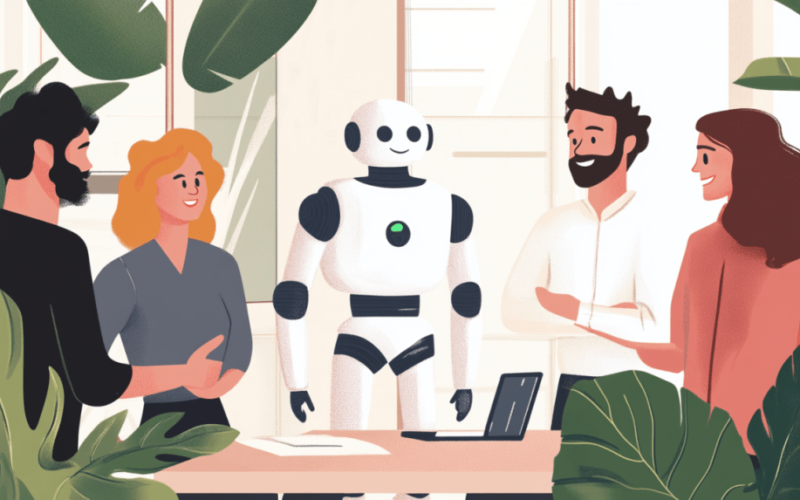Join our daily and weekly newsletters for the latest updates and exclusive content on industry-leading AI coverage. Learn More
Salesforce unveiled Agentforce on Thursday, a suite of AI-powered autonomous agents designed to augment human workers across various business functions. The company positions this as the “third wave” of AI, moving beyond predictive models and generative AI to what it calls “agentic systems.”
Marc Benioff, Chair and CEO of Salesforce, emphasized the transformative potential of AgentForce during a press conference ahead of the global launch. “We’re about to enter this third wave of AI—and this third wave of AI, we’re going to know it as agents, and at Salesforce, we’re going to know it as Agentforce,” he said. “And yes, we’re very excited [about] the fourth wave. We can kind of start to start to see it, the wave of droids that’s coming, maybe this mythical fifth wave of AGI will come one day as well. But right now, in the here and now, we’re excited about agents.”
AI Agents: Salesforce’s answer to enterprise automation challenges
Agentforce builds on Salesforce’s existing platform, leveraging the company’s vast troves of customer data and its recently developed Data Cloud. Clara Shih, CEO of Salesforce AI, explained the platform approach: “The power of Agentforce is that it’s built from within. It is now part of every Salesforce cloud, every industry cloud, from financial services cloud to Health Cloud to government cloud and media cloud,” she said.
The company introduces several out-of-the-box agents for various roles, including service, sales development, and marketing campaign optimization. These agents can be customized using low-code tools, allowing businesses to tailor the AI to their specific needs without extensive technical expertise.

Benioff highlighted the importance of this platform approach: “What you need to be using is a platform that is doing all of those things for you and our platform, just as it’s managed your data for you and kept it safe and secure in a trusted way, is also going to give you the best artificial intelligence experience you could possibly have,” he said. “The most accurate, the most capable, the easiest and the lowest cost, and no other AI will be able to deliver that, because only we are delivering this platform approach, these autonomous agents that are learning and are taking action.”
Early adopters report significant gains with Agentforce implementation
Early adopters report significant productivity gains. Wiley, the educational publishing giant, has seen a 40-70% autonomous resolution rate for customer inquiries during its busy back-to-school season. Kaiser Permanente, one of the largest healthcare providers in the U.S., is using Agentforce to handle patient inquiries with over 90% resolution rates, according to Benioff.
Benioff shared an example from Disney. “When Disney benchmarked Atlas, they said it was giving them twice the accuracy of the AI that they were already using, which came from one of the extremely large vendors,” he said. “That idea that we were able to augment that employee and… give them more productivity, or help fundamentally, give that customer more revenue or more efficiency.”
However, the move comes at a time when concerns about AI’s impact on jobs and data privacy are at an all-time high. Salesforce emphasizes its commitment to ethical AI use, with Shih noting that Agentforce includes “ethical guardrails, like our toxicity filters, also built by Salesforce research,” she said.

Navigating the AI arms race: Salesforce’s strategic play in enterprise software
The announcement represents a significant strategic shift for Salesforce, which has been under pressure to demonstrate the value of its hefty investments in AI technology. By integrating AI agents deeply into its existing platform, the company bets that it can deliver more immediate and tangible benefits to its vast customer base than standalone AI solutions.
Industry analysts express cautious optimism but note that the real test will come as more customers adopt the technology. Salesforce’s platform approach could give them a significant edge in enterprise AI adoption, especially given their vast existing customer base and deep integration with business processes across industries.
However, the company faces several challenges. They’ll need to prove that these agents can deliver consistent value across diverse business scenarios while maintaining data security and ethical standards. This is particularly crucial given the increasing scrutiny on AI ethics and data privacy.
Moreover, Salesforce will need to differentiate Agentforce from other AI offerings in the market, including those from AI leaders like OpenAI and Anthropic, who are also heavily investing in AI for enterprise. The company’s emphasis on low-code development and seamless integration with existing Salesforce products could be a key differentiator, but it remains to be seen how this will play out in practice.
Another critical factor will be the performance and reliability of the Atlas Reasoning Engine. If it can consistently outperform other AI models in terms of accuracy and relevance, as claimed with the Disney example, it could give Salesforce a significant competitive advantage.
Salesforce plans to showcase Agentforce at its annual Dreamforce conference next week, where it aims to onboard at least 1,000 customers to the new platform. This aggressive rollout strategy underscores the company’s confidence in the technology and its potential to drive future growth.
As the AI arms race in enterprise software intensifies, Salesforce’s Agentforce launch marks a significant milestone. Benioff concluded, “This is going to be the most important thing we have ever done at Salesforce.” Whether it will live up to its promise of being “what AI was meant to be” remains to be seen, but the company clearly goes all-in on its vision of AI-augmented workforces.
Source link lol

